

Religion: Hinduism. ARC - Faiths and ecology - What does Hinduism teach us about ecology? Death and Afterlife in Hinduism. By Jayaram V Into blinding darkness enter those who worship ignorance and into greater darkness those who worship knowledge alone.
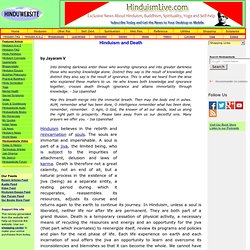
Distinct they say is the result of knowledge and distinct they also say is the result of ignorance. This is what we heard from the wise who explained these matters to us. He who knows both knowledge and ignorance together, crosses death through ignorance and attains immortality through knowledge. - Isa Upanishad May this breath merge into the immortal breath. Then may the body end in ashes. Hinduism. 248K 1288 884 270Google +268 Hinduism is an ancient world religion with no known founder or known date of origin.

The term "Hinduism" simply derives from the word "India" and refers to a wide variety of religious traditions and philosophies that have developed in India over thousands of years. Most Hindus worship one or more deities, believe in reincarnation, value the practice of meditation, and observe festive holidays like Diwali and Holi. When it comes to Hinduism, many people have questions like: What do Hindus believe about the universe and people? What gods and goddesses do they believe in? The table of contents below will direct you to various topics on Hinduism, from their beliefs to their symbols to their holidays to their sacred texts and much more. Featured Article: The Hindu View on Homosexuality. Welcome to the Heart of Hinduism. Hinduism. Sacred-texts home Journal Articles: Hinduism OCRT: Hinduism Buy CD-ROM Buy books about Hinduism Vedas Upanishads Puranas Other Primary Texts Epics Mahabharata Ramayana Bhagavad Gita Vedanta Later texts Modern books The Vedas There are four Vedas, the Rig Veda, Sama Veda, Yajur Veda and Atharva Veda.
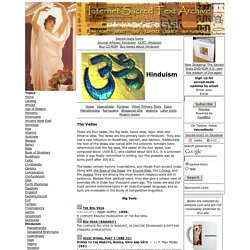
The Vedas are the primary texts of Hinduism. They also had a vast influence on Buddhism, Jainism, and Sikhism. World Religions. How did Hinduism begin?

Hinduism or Sanatana Dharma ("eternal spiritual path") began about 4000 years ago in India. It was the religion of an ancient people known as the Aryans ("noble people") whose philosophy, religion, and customs are recorded in their sacred texts known as the Vedas. These texts were initially handed down by word of mouth from teacher to student. It was not until much later that they were actually written down. Archeological evidence from the Indus Valley civilization of northwestern India helps to establish Hinduism as the world's oldest living religion. What do Hindus believe and practice? What is puja? Puja is the act of showing reverence to a god, a spirit, or another aspect of the divine through invocations, prayers, songs, and rituals.

An essential part of puja for the Hindu devotee is making a spiritual connection with the divine. Most often that contact is facilitated through an object: an element of nature, a sculpture, a vessel, a painting, or a print. During puja an image or other symbol of the god serves as a means of gaining access to the divine. This icon is not the deity itself; rather, it is believed to be filled with the deity's cosmic energy. It is a focal point for honoring and communicating with the god. Join the Hindu renaissance - Hinduism Today Magazine. Basics of Hinduism. Our beliefs determine our thoughts and attitudes about life, which in turn direct our actions.
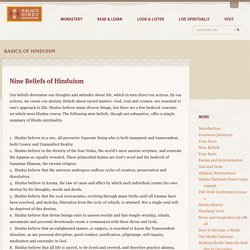
By our actions, we create our destiny. Beliefs about sacred matters--God, soul and cosmos--are essential to one's approach to life. Hindus believe many diverse things, but there are a few bedrock concepts on which most Hindus concur. The following nine beliefs, though not exhaustive, offer a simple summary of Hindu spirituality. Hinduism Origins, Hinduism History, Hinduism Beliefs. Hinduism. Hinduism, major world religion originating on the Indian subcontinent and comprising several and varied systems of philosophy, belief, and ritual.
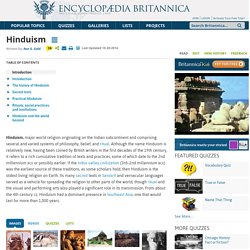
Although the name Hinduism is relatively new, having been coined by British writers in the first decades of the 19th century, it refers to a rich cumulative tradition of texts and practices, some of which date to the 2nd millennium bce or possibly earlier. If the Indus valley civilization (3rd–2nd millennium bce) was the earliest source of these traditions, as some scholars hold, then Hinduism is the oldest living religion on Earth. Its many sacred texts in Sanskrit and vernacular languages served as a vehicle for spreading the religion to other parts of the world, though ritual and the visual and performing arts also played a significant role in its transmission. From about the 4th century ce, Hinduism had a dominant presence in Southeast Asia, one that would last for more than 1,000 years.
Introduction. Hinduism for Beginners - What is Hinduism? If you're new to this faith, here's where to begin.
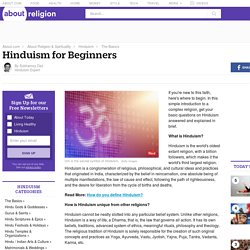
In this simple introduction to a complex religion, get your basic questions on Hinduism answered and explained in brief. Religion: Hinduism. HINDUISM: The world's third largest religion. Religions of the world Menu Sponsored link.
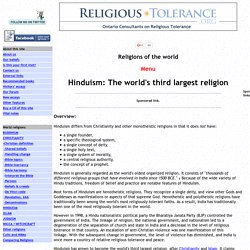
Overview: Hinduism differs from Christianity and other monotheistic religions in that it does not have: